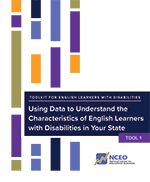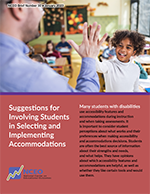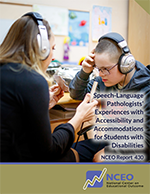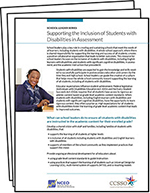Happy New Year from NCEO!
As we begin 2025, we’re delighted to introduce ourselves as NCEO’s new Co-Directors. Both of us bring extensive experience in assessment and a shared commitment to ensuring all students have meaningful opportunities to demonstrate their knowledge and skills. As we collaborate on leadership and management decisions, Kristi will serve as the Principal Investigator and Andrew as the Co-Principal Investigator will continue to lead technical assistance efforts.
With spring testing season on the horizon, this newsletter focuses on providing essential resources to support decision making around assessment participation. You’ll find briefs on determining appropriate assessment paths for students – whether through general or alternate assessments – along with tools to help teams select and implement accessibility features that best meet individual student needs. The first article highlights some of our newest resources on assessment participation and accessibility features decisions. The second “In Case You Missed It” article describes a few of our favorite resources on accessibility features.
We’re also excited to share an article with updates about NCEO’s presence at several major spring conferences. NCEO and our project partners will be well-represented at CEC, AERA, NCME, and the National Parent Center Conference, where our staff will share recent research and activities, as well as lead discussions on inclusive assessment practices. These conferences provide excellent opportunities to engage in conversations about the latest developments in the field and connect with colleagues. We hope to see you there!
Kristi Liu and Andrew Hinkle, NCEO Co-Directors
New Resources on Selecting and Implementing Accessibility Features
As state education agencies (SEAs) prepare for spring testing, we want to share with you some new resources for improving assessment participation through the effective use of accessibility features. Many students, including students with and without disabilities, use accessibility features (universal features, designated features, and accommodations) to show what they know and can do on classroom and state assessments. Getting these accessibility features right is essential to all students participating in assessments and our assessments providing accurate and actionable data.
The English Learners with Disabilities Toolkit
NCEO recently published a new series, The English Learners with Disabilities Toolkit, that provides resources for states and IEP teams to determine appropriate assessment participation for English learners with disabilities, particularly English learners with the most significant cognitive disabilities. Read entire article
Accommodations Toolkit
One of NCEO’s most popular resources, the Accommodations Toolkit, has been updated! The toolkit is organized by accommodation or accessibility feature (e.g., tactile graphics, braille, test breaks, extended time, etc.), with easy-to-use research and policy summaries for each accommodation. The resources in the toolkit are designed to support the work of state education agencies, but may also be helpful to technical assistance providers, researchers, and others. Read entire article
In Case You Missed It: Favorite Resources on Selecting and Implementing Accessibility Features
Student and Teacher Perceptions When Selecting and Implementing Accommodations
Selecting the appropriate accessibility features for every student is most effectively done with the involvement of all Individualized Education Program (IEP) team members, including students and teachers. NCEO has two briefs that focus on considering student and teacher perceptions when making decisions about selecting and implementing accommodations (see the following briefs: Suggestions for involving students in selecting and implementing accommodations (NCEO Brief #30) and Teacher perceptions and perspectives on the selection and implementation of accommodations (NCEO Brief #34. Read entire article
The Roles of Speech-language Pathologists and Psychologists in Selecting Accommodations
Depending on a student’s disabilities and needs, it may be important to include a speech pathologist or a school psychologist in the decision-making process. NCEO has resources on the roles of speech pathologists and school psychologists in selecting accommodations, see the following reports: Speech-language pathologists’ experiences with accessibility and accommodations for students with disabilities (NCEO Report 430) and School psychologists’ role in accommodations decision making (NCEO Brief #32). Read entire article
The School Leader Series
School leaders play a key role in supporting assessment systems that are inclusive of all learners and provide opportunities for all students to participate in grade-level assessments. NCEO’s School Leader Series suggests a team approach, where there is shared responsibility for supporting the instruction and assessment of all students. Read entire article
Upcoming Presentations at CEC, CPIR, AERA, and NCME
NCEO and MIDAS staff will present at the annual conferences of the Council for Exceptional Children (CEC), the Center for Parent Information and Resources (CPIR), the National Council on Measurement in Education (NCME), and the American Education Research Association (AERA). Read entire article
The Center is supported through a Cooperative Agreement (#H326G210002) with the Research to Practice Division, Office of Special Education Programs, U.S. Department of Education. The Center is affiliated with the Institute on Community Integration at the College of Education and Human Development, University of Minnesota. Consistent with EDGAR §75.62, the contents of this report were developed under the Cooperative Agreement from the U.S. Department of Education, but do not necessarily represent the policy or opinions of the U.S. Department of Education or Offices within it. Readers should not assume endorsement by the federal government.
Project Officer: David Egnor





